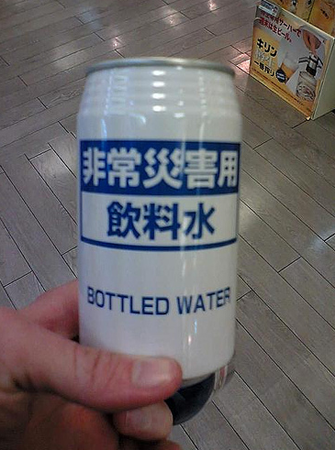Life Cycle is a series of posts that looks at the life and death of everyday things.

Fool me once, shame on me. Fool me twice, shame on you.
In the United States, we pay for our tap water (either through a direct bill or taxes), and then we pay again when we buy bottled water - forty percent of which comes from municipal sources, which means it's still essentially tap water.
Why are we paying for it twice? We pay more for water than we do for milk or gasoline (somehow less cute than the common wisdom that wine is cheaper than water in France).
And Mother Earth pays, too. MSN money honey Anthony Mirhaydari sums up the eco-challenge nicely:
A recent report by the Swiss Gas and Water Association finds that bottled water has 100 times the environmental impact of tap water. The Sierra Club notes that bottled water produces 1.5 million tons of plastic waste each year - the vast majority of which ends up in our landfills and oceans. According to two oceanographers with the British Antarctic Survey, while strolling along the shores of Spitsbergen Island up in the Arctic ocean, where mankind's doomsday Svalbard Global Seed Vault is located, one can find a piece of plastic detritus every 15 feet or so.
We use water to manufacture the petroleum-based plastic bottle the water comes in, and we use fossil fuels to ship water from Fiji or France to our tables.
Hello, people. We have the privilege of living in a country where we can drink our water. But we've been seduced by the beverage industry into believing only they can quench our thirst with colored, caffeinated, vitaminized, electrolyted water. We have become so parched that we can't walk down the street without toting a single-use plastic bottle touting the magical effects of its water source.
Apparently, Kabbalah Water will heal us and Bling Water will define us. At the Bling H20 website, Bling Water "creator" Kevin Boyd describes noticing on Hollywood studio lots that "you could tell a lot about a person by the bottled water they carried." First of all, didn't god create water? Secondly, the water is bottled in Dandridge, Tennessee - since when is Southern Tennessee a spring of L.A. status? Yes, Dandrige's water ranks very highly on EPA's water quality index, but why are we spending so much money ($40 for Bling's "Go Green" 750ml bottle) on cross-continental water instead of cleaning up our local waterways? Tinseltown's water is so polluted with run-off and industrial contamination that perhaps water by way of Tenessee does make sense.
Here's what the less blingy among us do:
1) Work to identify problems at the source, pushing for the protection of Wetlands.
2) Reduce the amount of toxic junk we flush down and rinse away (including pharmaceuticals).
3) Lobby our local officials to protect our source water.
4) Use it sparingly: in the yard, in the house, everywhere.
5) Carry our own bottles (Coated aluminum is Siman's preference, Sarah goes with BPA-free plastic) and proudly fill up at water fountains and taps.
We are not naïve. We know there's so much work to do around water - who has it, how they use it, if it's clean, how it gets carried, who pollutes it, who squanders it, how much of it we have left, and so on. On the one hand it makes our small changes seem, well, small. On the other, we know that even the micro-movements are crucial.
The marketers are right. We can't live without water. But we can live without the overzealous way it's being sold to us. Drink that in.
This post was written by Simran Sethi and Sarah Smarsh. Thanks to the University of Kansas School of Journalism and Lacey Johnston for research assistance and tengpow for the image. You can find previews of these posts every week on Green Options. Hear Simran talk more about the connection between our stuff and our planet - and water issues - this Wednesday, 8/27 at the IDP in New York.